Disclaimer: This is an educational tutorial to understand Bitcoin, not investment advice.
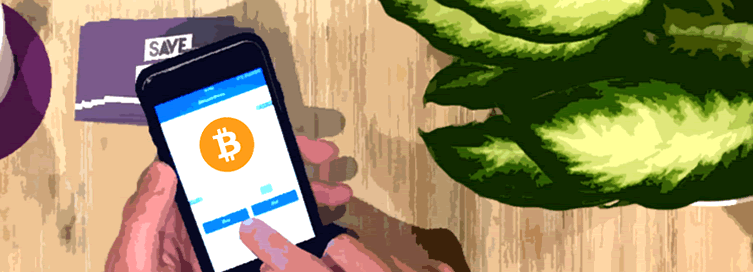
In 2013 I set out to buy one whole Bitcoin for £200. But it never actually happened.
The closer I got to buying, the more confused and worried about the whole thing I got. So I gave up.
I wasn't to know, but if I'd persevered, that Bitcoin would now be worth over £6,000.
With the ongoing surge in interest and media coverage, the conversation gets louder and louder, and so much harder to ignore.

Bitcoin could have huge implications for everyone's future. I felt it was time to try again. Not to make money, but to understand what the hell all the fuss was about.
The itch led me down a rabbit hole of research, fueled by fascination and excitement. I finally 'got it'. It also became obvious that today it's far easier to buy Bitcoin than it was 4 years ago.
Today I'm the proud owner of 0.01603666 BTC, which I exchanged for £100.
In this guide, I take you through the exact steps I followed to buy Bitcoin. The process itself took about 15 minutes.
But before we get to the tutorial steps, it's really important to know what we're getting into. Increasingly I hear from students making mistakes due to rushing into Bitcoin because of all the hype. There's so much fragmented or misleading information out there. My aim here is to strip it to total basics without putting you off for another 4 years (hopefully).
But Bitcoin is much more than a currency, and this is why people often get confused. It's also the entire network (known as a Blockchain) that securely oversees the entire process of someone sending money to someone else.
Say you spend £20 at a restaurant on a Visa debit card. That transaction must be processed through a card machine, Visa, your bank and the merchant bank. At each step, communication and verification takes place.
Bitcoin's promise is removing all of this friction involved in the verification, whilst also making payments much more secure. You could use your mobile phone to send £20 worth of Bitcoin to the restaurant directly.
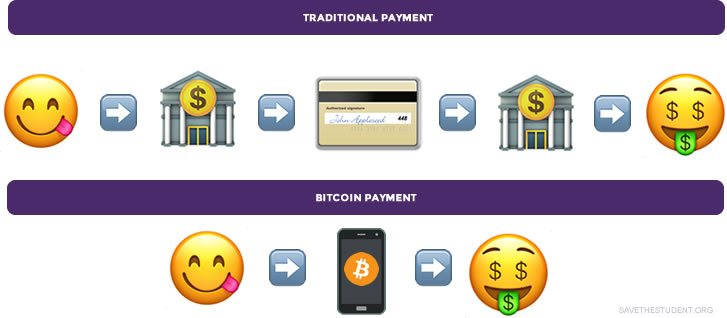
Now to make it completely real for you, here's a guy buying an ice-cream with Bitcoin back in 2014:

In 2013 I set out to buy one whole Bitcoin for £200. But it never actually happened.
The closer I got to buying, the more confused and worried about the whole thing I got. So I gave up.
I wasn't to know, but if I'd persevered, that Bitcoin would now be worth over £6,000.
With the ongoing surge in interest and media coverage, the conversation gets louder and louder, and so much harder to ignore.

Bitcoin could have huge implications for everyone's future. I felt it was time to try again. Not to make money, but to understand what the hell all the fuss was about.
The itch led me down a rabbit hole of research, fueled by fascination and excitement. I finally 'got it'. It also became obvious that today it's far easier to buy Bitcoin than it was 4 years ago.
Today I'm the proud owner of 0.01603666 BTC, which I exchanged for £100.
In this guide, I take you through the exact steps I followed to buy Bitcoin. The process itself took about 15 minutes.
But before we get to the tutorial steps, it's really important to know what we're getting into. Increasingly I hear from students making mistakes due to rushing into Bitcoin because of all the hype. There's so much fragmented or misleading information out there. My aim here is to strip it to total basics without putting you off for another 4 years (hopefully).
What is Bitcoin?
To many people Bitcoin represents the future of paying for something, as a new digital global 'cryptocurrency'. Rather than using a £1 coin or $1 bill, something could be 1 Bitcoin (1 BTC).But Bitcoin is much more than a currency, and this is why people often get confused. It's also the entire network (known as a Blockchain) that securely oversees the entire process of someone sending money to someone else.
Say you spend £20 at a restaurant on a Visa debit card. That transaction must be processed through a card machine, Visa, your bank and the merchant bank. At each step, communication and verification takes place.
Bitcoin's promise is removing all of this friction involved in the verification, whilst also making payments much more secure. You could use your mobile phone to send £20 worth of Bitcoin to the restaurant directly.

Now to make it completely real for you, here's a guy buying an ice-cream with Bitcoin back in 2014:
By cutting out the middlemen, transactions become much cheaper too, especially when it comes to international payments.
Bitcoin also takes on the role of government central banks (eg. The Bank of England). Governments traditionally have control over the supply of currency which is open to manipulation and corruption.
The Bitcoin Blockchain is completely open. It isn't owned or controlled by anyone, it's run by a network of many computers around the world.
Of course the young cryptocurrency is not without its critics. Mainstream media, traditional banks and financial commentators all warn against a 'bubble' set to burst, and the opportunity for Bitcoin to be used by criminals.
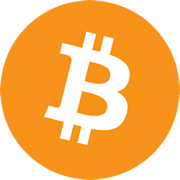 As
a total novice, I spent days researching the ins and outs of Bitcoin,
its benefits and risks. Here's my distilled list of the key points.
As
a total novice, I spent days researching the ins and outs of Bitcoin,
its benefits and risks. Here's my distilled list of the key points.
You don't need to understand everything.
Under the bonnet Bitcoin is an incredibly complex technology, which makes it so secure. Most people don't really know how card machines or even the internet works but still use them everyday.
We'll dig deeper into the background and implications of Bitcoin later if you're keen to learn more
 Firstly,
you don't need to buy a full Bitcoin. That would be preeetty expensive
now! A Bitcoin can be divided all the way down to a one hundred
millionth. You can buy as little as £5 if you wish.
Firstly,
you don't need to buy a full Bitcoin. That would be preeetty expensive
now! A Bitcoin can be divided all the way down to a one hundred
millionth. You can buy as little as £5 if you wish.
If you can't spare £5 or are in debt please don't buy Bitcoin as you could lose money.
There are 3 types of people buying Bitcoin:
Once you actually give it a go by buying and sending some Bitcoin, it becomes a whole lot simpler to understand!
So yes, I believe everyone would benefit by buying a tiny bit of Bitcoin just to educate themselves on what could quickly become part of our future.
There are plenty of other (potentially questionable) methods and websites you could use - which could be slightly cheaper - but this was all about minimising risk and complication for myself as a total newbie.
You need just 5 things before buying Bitcoin:

I also like their intuitive website and mobile app, which allows me to send and receive Bitcoin on the move. The whole process took me less than 15 minutes.
To receive Bitcoin from someone else, they just need your unique Bitcoin address. You can find yours by clicking the "Receive" button. It's also in a QR format that's very convenient on mobiles.
To send Bitcoin, there are a couple more steps:
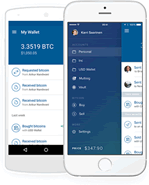
The Coinbase app allows you to access your wallet on the move.
This of course opens up the ability to spend and transfer Bitcoin locally using QR codes, for example in shops or between friends at dinner.
Bitcoin transfers are also stored in the publicly available Blockchain, but they're completely anonymous because there's no way to associate the addresses with people.
Just for kicks, click here to see an example transaction I sent to a friend's wallet. Again, don't worry about understanding it, but we'll come back to Blockchain technology later if you're interested.
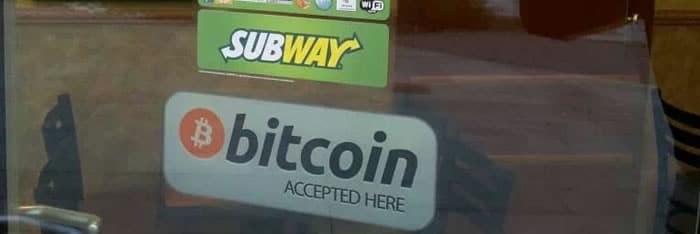 From local London pubs to global retailers, businesses of all sizes are starting to accept Bitcoin as payment.
From local London pubs to global retailers, businesses of all sizes are starting to accept Bitcoin as payment.
You can even pay tuition fees at Cumbria University with Bitcoin, and there have been rumours that Amazon will soon be joining the party.
Here are some examples of well-known brands currently accepting Bitcoin as payment:
Bitcoin also takes on the role of government central banks (eg. The Bank of England). Governments traditionally have control over the supply of currency which is open to manipulation and corruption.
The Bitcoin Blockchain is completely open. It isn't owned or controlled by anyone, it's run by a network of many computers around the world.
Of course the young cryptocurrency is not without its critics. Mainstream media, traditional banks and financial commentators all warn against a 'bubble' set to burst, and the opportunity for Bitcoin to be used by criminals.
12 key things to know about Bitcoin
 As
a total novice, I spent days researching the ins and outs of Bitcoin,
its benefits and risks. Here's my distilled list of the key points.
As
a total novice, I spent days researching the ins and outs of Bitcoin,
its benefits and risks. Here's my distilled list of the key points.- Trust - Fills the 'trust gap' between two parties (currently the role of banks)
- Secure - Transactions encrypted within a Blockchain which is impossible to hack
- Decentralised - With no one body in control, it can't be taken down, hacked or manipulated
- Unregulated - There's no guarantee of protection if a payment is made in error
- Transparent - Both code and all transactions (imagine knowing where every tax penny went)
- Low cost - Removes institutions and friction, especially for international payments
- Speed - Complete digital network (and no more loose change!)
- Limited supply - Capped at 21 million Bitcoins
- Truly global - Doesn't geographically exclude people
- Privacy - Institutions don't hold your data
- Virtual - Despite its name, Bitcoin has no physical coins. All 1s and 0s
- Volatile - Bitcoin value fluctuates wildly as it's still relatively new.
You don't need to understand everything.
Under the bonnet Bitcoin is an incredibly complex technology, which makes it so secure. Most people don't really know how card machines or even the internet works but still use them everyday.
We'll dig deeper into the background and implications of Bitcoin later if you're keen to learn more
Should you buy Bitcoin?
 Firstly,
you don't need to buy a full Bitcoin. That would be preeetty expensive
now! A Bitcoin can be divided all the way down to a one hundred
millionth. You can buy as little as £5 if you wish.
Firstly,
you don't need to buy a full Bitcoin. That would be preeetty expensive
now! A Bitcoin can be divided all the way down to a one hundred
millionth. You can buy as little as £5 if you wish.If you can't spare £5 or are in debt please don't buy Bitcoin as you could lose money.
There are 3 types of people buying Bitcoin:
- Speculators - the value has risen massively, but it's still very volatile making Bitcoin a risky investment
- Actual users - what it's all for! Spending and even earning in Bitcoin is slowly gaining traction
- The curious - Bitcoin's an exciting new technology, and many want to just understand the future of money and be part of the conversation.
Once you actually give it a go by buying and sending some Bitcoin, it becomes a whole lot simpler to understand!
So yes, I believe everyone would benefit by buying a tiny bit of Bitcoin just to educate themselves on what could quickly become part of our future.
I do think Bitcoin is the first cryptocurrency that has the potential to do something like change the world - Peter Thiel, Co-Founder of PayPal
How to buy Bitcoin tutorial
I'm going to walk you through the exact steps I took to buy my own Bitcoin. I bought some for the sole purpose of going through the motions.There are plenty of other (potentially questionable) methods and websites you could use - which could be slightly cheaper - but this was all about minimising risk and complication for myself as a total newbie.
You need just 5 things before buying Bitcoin:
- Bitcoin address - A string of numbers unique to you, that allows you to receive Bitcoin (acts like a bank account number). Also known as a 'public key'.
- Bitcoin wallet - A secure place to store your Bitcoin (acts like a bank account).
- Bitcoin exchange - A website to convert old-school cash into Bitcoin (acts like a bureau de change).
- Payment method - A debit or credit card to buy Bitcoin.
- Form of identity - You'll need your passport or driver's license to hand.
7 steps to buying your first Bitcoin
After some lengthy research, I decided on using Coinbase as a 'one stop shop'. They set me up with an address, a wallet and the conversion of pounds to Bitcoin itself.
I also like their intuitive website and mobile app, which allows me to send and receive Bitcoin on the move. The whole process took me less than 15 minutes.
-
Create a Coinbase account
Click here for a special promo page inviting you to join.
Complete the short form and hit "Sign up".
With this link you're able to receive a bonus amount of free Bitcoin
if you buy or sell over $100/£74 (you don't have to). Once you're on
Coinbase you can invite your friends in the same way
-
Verify your email
Head to your inbox and click the verification link. It may take a few minutes to arrive (check junk folder if longer). -
Connect your phone
To secure your account, you'll now be asked to link up your mobile phone.
This is known as 2-factor authentication and means no one can access your account without knowing your password and holding your phone.
Coinbase will immediately send you an SMS with a code. Enter this in the box, and your account's created and secured -
Verify your identity
You're now looking at your dashboard, but before being able to buy Bitcoin you need to verify your identity.
Scroll down and click the "Verify your identity" block (bottom left).

Select an ID type. Now decide how you want to take a photo of it (webcam or mobile).
The live verification check only takes a minute or so. -
Add a payment method
Back on the dashboard, scroll down and now click "Add a payment method".
For the purposes of this tutorial, I suggest using a debit or credit card. This allows you to buy Bitcoin instantly, but note there is a small fee.
Bank transfer is an option, but that takes several days to setup. Also when I tried it had to be made in Euros (which for the small amount I bought would have cost me more in bank fees than a card).
Run through the card authentication process and now you're ready to buy your first Bitcoin. -
Buy Bitcoin
Click "Buy/Sell" in the top menu.
Ensure "Bitcoin" is selected and your payment method should be pre-loaded.
Enter in the amount of money (or Bitcoin) you wish to buy. I bought £100 but it could be as little as £5 (£74 is needed for the £7 signup bonus).
The conversion will be automatically shown. The box on the right shows the full transaction, including the fees.
Click "Buy Bitcoin Instantly" and the Bitcoin will be added to your wallet immediately. Congrats!
In my example, I purchased £100 with total Coinbase fees of £3.41. The remaining £96.59 bought me 0.01603666 Bitcoin.
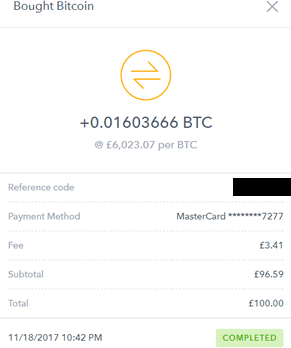
-
Check your Bitcoin wallet
Click "Accounts" in the top menu.
Under "BTC Wallet" you should now see your Bitcoin amount and the transaction.
This is also where you're able to send and receive Bitcoin.
Sending and receiving Bitcoin
Sending and receiving Bitcoin is all managed from your Coinbase Bitcoin wallet.To receive Bitcoin from someone else, they just need your unique Bitcoin address. You can find yours by clicking the "Receive" button. It's also in a QR format that's very convenient on mobiles.
To send Bitcoin, there are a couple more steps:
- Click the "Send" button
- Enter the BTC address of the receiving person or wallet
- Enter the BTC amount (to be sent from your wallet)
- Write a message (acts like a payment reference)
- Click "Continue" to confirm the transaction
Download the app

The Coinbase app allows you to access your wallet on the move.
This of course opens up the ability to spend and transfer Bitcoin locally using QR codes, for example in shops or between friends at dinner.
Bitcoin transactions
Remember there is a log of all transactions within your Bitcoin wallet.Bitcoin transfers are also stored in the publicly available Blockchain, but they're completely anonymous because there's no way to associate the addresses with people.
Just for kicks, click here to see an example transaction I sent to a friend's wallet. Again, don't worry about understanding it, but we'll come back to Blockchain technology later if you're interested.
What can you buy with Bitcoin today?
 From local London pubs to global retailers, businesses of all sizes are starting to accept Bitcoin as payment.
From local London pubs to global retailers, businesses of all sizes are starting to accept Bitcoin as payment. You can even pay tuition fees at Cumbria University with Bitcoin, and there have been rumours that Amazon will soon be joining the party.
Here are some examples of well-known brands currently accepting Bitcoin as payment:
Where you can spend Bitcoin
- CeX (entertainment)
- Dell (computers)
- Expedia (travel)
- Girl Meets Dress (fashion)
- Lush (cosmetics)
- Microsoft (computers)
- RNLI (charity)
- Scan.co.uk (computers)
- Steam (video games)
Growth of Bitcoin across the UK
You may also be surprised by how many places near you now accept Bitcoin.
Enjoying the guide? Please share it with your friends
How does Bitcoin work?
 As
I've mentioned, it's not essential to understand exactly how Bitcoin
works to use it. That said, knowledge is power and I personally find it
fascinating.
As
I've mentioned, it's not essential to understand exactly how Bitcoin
works to use it. That said, knowledge is power and I personally find it
fascinating.Bitcoin is actually built on a much broader technological advance known as Blockchain.
What is Blockchain?
Blockchain technology is a super-secure way of publicly verifying the transfer of information between two parties.When a transfer takes place, a block is added to the chain chronologically. Each block contains sets of data relating to the transaction, and also relates to the previous block with a cryptographically generated signature. It's this signature that locks (or chains) all the blocks together, so that a block can never be modified once it's created.
Seen as a kind of public ledger, a Blockchain is stored in the cloud across thousands of computers around the world. The mix of the chain being decentralised and blocks bound together makes Blockchain technology practically unhackable.
Bitcoin was the first and most popular implementation of Blockchain. When you send some Bitcoin to another person, the transaction will be verified by lots of computers in the Bitcoin Blockchain and create a new block.
You can see a real example of a block here. This is a Bitcoin transaction I made. Note the "Confirmations" icon: 1,814 separate computers have already verified this transaction.
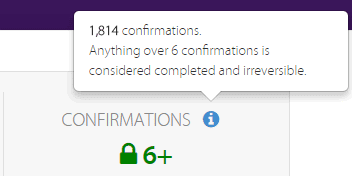
But in fact any form of transfer that requires validation can utilise the technology, anything from licensing music, sharing medical records to buying a house.
Ethereum is another kind of cryptocurrency that also goes beyond money to handle 'smart contracts'. This means a legal document such as the transfer of Title Deeds can be quickly validated for a property sale, for example.
Even the British government are being encouraged to adopt Blockchain.
Whilst it's still early days, some experts predict that Blockchain technology will lead us into a "trust" revolution, following on from the industrial and informational revolutions.
Where do Bitcoins come from?
New Bitcoin is created as a result of 'mining', which is conveniently also the way that every Bitcoin transaction is processed and verified.For every transaction, mining computers must solve very complex mathematical problems and generate a 64 digit solution. Once solved, one block is added to the Bitcoin chain and the miner earns a certain amount of new Bitcoin as a reward.
The Bitcoin Blockchain is programmed to only ever release 21 million Bitcoins. Once they've all been mined no more will ever be created.
This is estimated to happen by July 2020. At time of writing there are over 16.7 million in existence (live count here).
What are the downsides of Bitcoin?
It's important to remember it's still very early days. All new technology comes with obstacles and trade-offs, just as we've seen with the internet and disruptors like Uber.Some of Bicoin's disadvantages:
- Great amount of price volatility in the short term
- Built-in deflation could maintain volatility longer term (due to max. 21m BTCs)
- It's a currency and a commodity, meaning people incentivised to hold rather than spend Bitcoin
- Huge volume of transactions processed slows down verification (whole network upgrades needed)
- No intrinsic value - just what someone else is prepared to pay (like gold)
- No buyer protection
- Used for criminal transactions as it's untraceable (like cash)
- Not widely accepted yet
- Possibility of governments prohibiting merchants from accepting Bitcoin
- Lots of people working in finance will lose jobs
Why has Bitcoin got so popular?
In 2010 someone bought just two pizzas for 10,000 Bitcoin. Today those pizzas would be over £72 million.The phenomenal growth follows Bitcoin becoming increasingly widespread, really hitting a tipping point in 2017 as its value surged by more than 880% in 12 months.

Bitcoin had the advantage of being the first cryptocurrency, but I don't think there's one specific reason why Bitcoin itself has become so popular.
Various political events have added to the mix since 2009, along with technological advances and media attention.
For example, HMRC, the European Court and Japan have recently recognised Bitcoin as a real currency, whilst Chinese investors are increasingly keen to move their money away from the control of Chinese government.
The financial crisis of 2008 undoubtedly also gave Bitcoin a big step up. Big banks revealed their vulnerabilities and many people lost trust in institutions.
It's inevitable
In 1988 The Economist predicted a world currency by 2018. The idea is nothing new!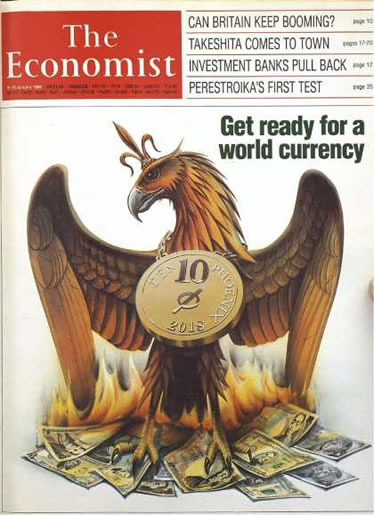
Is something like Bitcoin not just the natural next stage of progression? Bitcoin offers a democratic, digital, fast, secure global currency.
'Money' has already gone from grain to metals to paper to electronic (online banking, credit cards, PayPal etc). Perhaps we're on the cusp of going completely digital, and Bitcoin is taking the lead.
With all the advantages that Bitcoin (and Blockchain) carries - and that only 0.1% of the global population are participating so far - the momentum is likely to continue.


This is great... I'm sure this is a blogspot but it looks like a wordpress
ReplyDelete